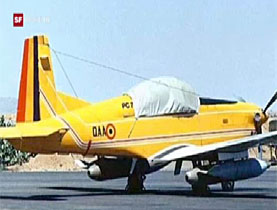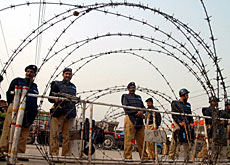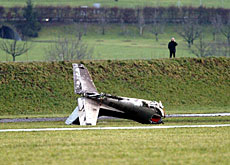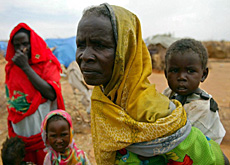Chad likely armed Swiss-made aircraft

The Swiss government has summoned Chad's ambassador to explain why his country may have equipped a Pilatus aircraft with weapons in breach of export agreements.
On Thursday, Swiss officials confirmed that the PC-9 suspected of being used in attacks on Darfur was refitted to carry weapons.
The State Secretariat for Economic Affairs (Seco) said it was not clear whether the plane had been used for military purposes by the Chadian government, which is fighting rebels in the east of the country along the border with Sudan.
But Seco said the aircraft, which was sold to the African country in 2006 on the condition that it would be used only to train pilots, had “very probably” been armed.
Media reports quoting military sources in the African region said attacks on rebels in Darfur were carried out by Chadian helicopters and a PC-9 aircraft on January 7.
Swiss law forbids the export of military equipment to areas of conflict. The sale was approved by the government in June, 2006.
The Pilatus aircraft are subject to Switzerland’s Goods Control Act (GKG), which provides for the export of dual-use goods and armaments that do not come under the stricter War Material Act.
This has been harshly criticised by the centre-left Social Democrats and pacifist groups, including the president of the commission on security issues, the Social Democrat Barbara Haering.
Haering said at the time of the sale that it was cynical for Switzerland to support peace initiatives in the region while delivering aircraft that could be deployed in combat missions.
Earlier conflicts
The Swiss government came under repeated fire in the 1990s from non-governmental organisations for sales of Pilatus planes to governments in conflict zones, including the military junta in Myanmar and the apartheid regime in South Africa.
But on Thursday, Seco director Jean-Daniel Gerber said that neither the United Nations nor the European Union had imposed any sanctions on Chad, which would have been grounds for Switzerland to delay the sale.
Gerber ruled out such exports under the current conditions.
No details about the meeting with Chad’s ambassador were revealed but Swiss officials said they were continuing their investigation into the affair.
They also said they were expecting to receive further information about Chad’s PC-9 from the aircraft manufacturer located in the central Swiss town of Stans, including more about the role of the Pilatus maintenance staff assigned to Chad.
The company has said the African nation possesses three PC-7s and one PC-9. The latter was delivered to Chad to replace a PC-7 which it had purchased from France.
swissinfo with agencies
Dual-use goods that can be used for civil and military purposes and for defence equipment, are subject to export controls.
The Goods Control Act (GKG) provides for goods and armaments not controlled by the War Material Act. Simulators are one such class of goods.
The War Material Act provides in particular for the export of weapons, ammunition and defence equipment that have been designed specifically for use in war or armed combat.

In compliance with the JTI standards
More: SWI swissinfo.ch certified by the Journalism Trust Initiative



You can find an overview of ongoing debates with our journalists here. Please join us!
If you want to start a conversation about a topic raised in this article or want to report factual errors, email us at english@swissinfo.ch.